Harry Bannerman on Scottish success, his close calls and playing Arnie in Ryder Cup
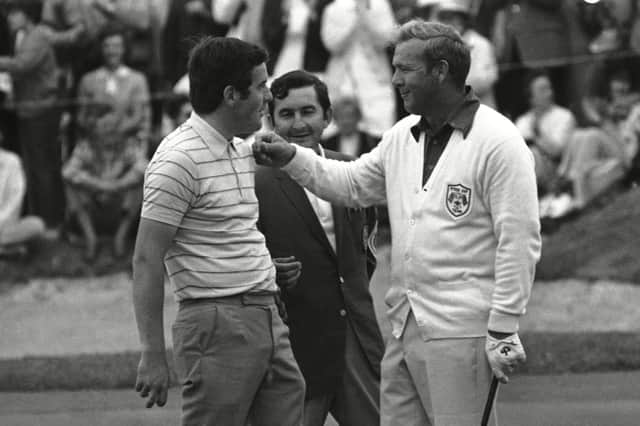

The Aberdonian, who is about to turn 79, won three Northern Opens, two Scottish Professional Championships and made eight Open Championship appearances.
He also secured a halved match against the legendary Arnold Palmer in the Ryder Cup and takes a walk down memory lane in this exclusive interview.
Advertisement
Hide AdAdvertisement
Hide AdIn comparison to the modern game, you seemed to be a late developer in the sport. Why was that?
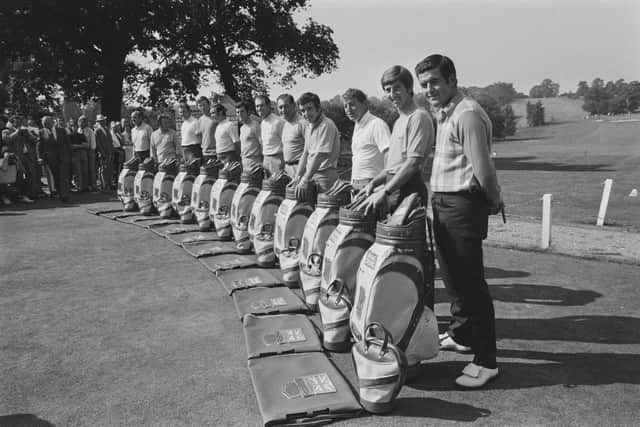

HB: Well, to play amateur golf, which was essential in the early stage of my career, I couldn’t afford it. I would have loved to have been playing in events like the Scottish Amateur, and I did a couple of times in the Ronnie Shade era, but I had a young family, so I couldn’t get to where I wanted to be straight away.
Was there anything in particular that changed and opened up the door on your career?
HB: I started to win a few tournaments as an amateur against the pros and I managed to secure some sponsorship from members of my golf club, Murcar, and a prominent Royal Aberdeen man called J K Hall. Three of them sponsored for me for a couple of years and I was 23 or 24 when I turned pro.
What was the highlight of your amateur career?
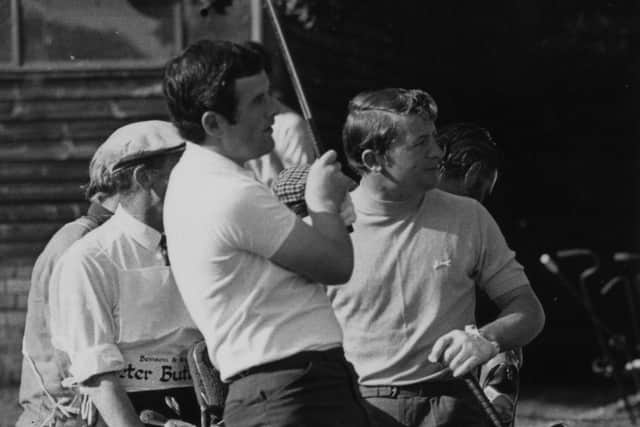

HB: I won umpteen tournaments, all local, but I never got a Scottish cap due to the fact I could never afford to go down and play in tournaments in the Central Belt because, even back then, it was very difficult to get anywhere without money. So I mainly played in the North and North East.
How pleasing was it that people saw potential in you and came up with that sponsorship then?
HB: It was important, definitely, and it was certainly very satisfying indeed when I won the Scottish Professional Championship as a debutant in 1967 at Montrose.
And, in 1972, you won that event for a second time by a staggering 10 shots. How special was that?
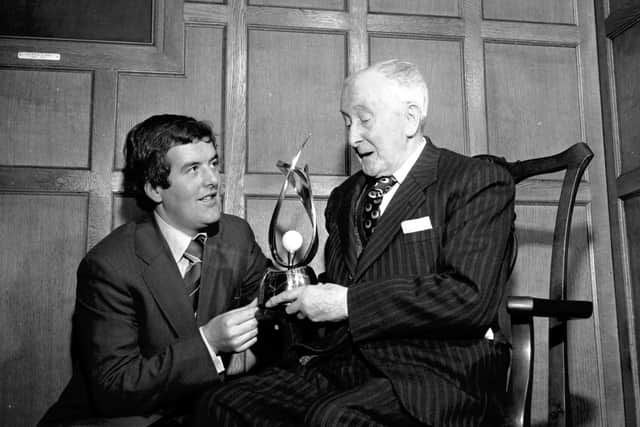

Advertisement
Hide AdAdvertisement
Hide AdHB: If it had been boxing, they would have stopped it (laughing). Brian Barnes, Bernie Gallacher, Ronnie Shade, Sam Torrance, George Will, all good players, would all have been in that field. I remember playing with Alistair Thomson, a very good golfer from Inverness, and years later he said to me, ‘remember that day at Strathaven? You played 36 holes on the final day without a bogey’. And that, of course, was all down to hitting the fairway. As Ben Hogan said, golf starts with the driver. They all think it’s the putter, but I would say the driver is the key club in the bag.
You made it to the last day in five of your eight Open Championship appearances. How did that feel at the time?
HB: To have played in eight is quite a big number and it was great to get to the last day so many times. I tied for 11th at Birkdale 1971 and was then 19th at Muirfield the following year. The highlight of the latter was in the fourth round when I was out in 30 and it was up on the IBM scoreboard: Bannerman out in 30.
European players used to find it difficult to get into the Masters, but you played at Augusta in 1972. How did that opportunity come about?HB: Well, I have it framed and it was an invitation to the Masters from the great Bobby Jones himself. It was because I was in the top six on the European order of merit and the previous year I had played well in the Ryder Cup in America. Because of that, I was getting other invitations to play in the States, which was much appreciated.
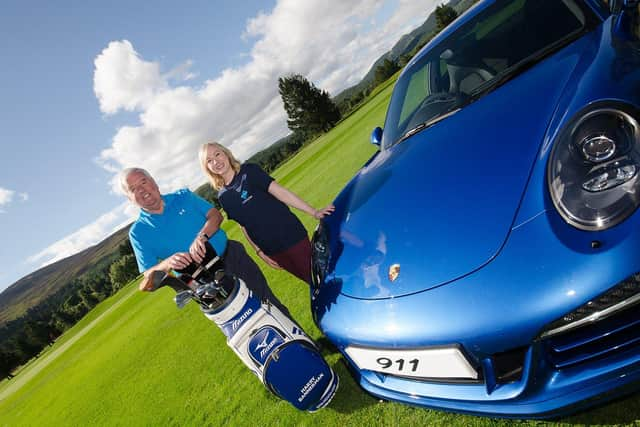

How did you find playing Augusta National?
HB: I had never putted on greens that speed. They were really, really fast, but I made the cut. I had a couple of good scores and a couple of high scores. The winner was 286 and that was Jack Nicklaus and I shot 300. I was very pleased with that performance.
On the European Tour, you recorded three runner-up finishes but never managed to land a victory. Was that disappointing?
HB: I never won a recognised tournament on the European Tour, but I had a few close calls. The Benson & Hedges International was played at Fulford in York and, in 1972, I was playing with the great Australian, Jack Newton. I three-putted the 72nd hole and he won by one shot. That was a big tournament for me. In 1975 in the Irish Open in Dublin, I had to pre-qualify and came through a play-off with a birdie. I then shot 20-under-par only to lose out by a shot to Christy O’Connor jnr. The next year, also in the Irish Open at Portmarnock, I had four consecutive 73s and tied for sixth with Gary Player. He departed the tournament by helicopter and he made his flight. I departed in gridlock traffic and I didnae make my flight (laughing). Those were the days.
The Ryder Cup in 1972 at Old Warson Country Club in St Louis. Eric Brown captained the team and both Bernard Gallacher and Brian Barnes were also in the line up. How was that experience?
Advertisement
Hide AdAdvertisement
Hide AdHB: It was a huge honour but, if there are 12 players in a team, I don’t want to see four players sitting out as substitutes (as happens in the fourball and foursome sessions). I want to see everyone playing. John Garner was in the Ryder Cup in 1971 and 1973 yet, from a possible 12 matches, he played in just one. That is wrong and I spoke to people like Bernie, Sandy Jones and David Huish about this. You need substitutes for rugby, but, in golf, everyone should be out on the course playing.
You picked up two-and-a-half points in that match, including a half with Arnold Palmer. That must have been nice at the time?
HB: Well, I got a foursomes victory with Bernie against Billy Casper and Miller Barber. We beat them fair and square. Bernie was a better player than me but, on that particular day, I was a strong partner for him. We were dropped the next day and I remember Peter Oosterhuis saying to Eric Brown, ‘come on, dinnae break up Harry and Bernie’. But Eric was his own man.
And that match against the legendary Palmer?
HB: I remember my caddie responding to me hitting some good shots by turning to me and saying, ‘Boss Harry, let’s take Mr Palmer out and he ain’t going to like it’ (laughing). I was one up with one to play but hit the Murcar hook shot into the rough and that allowed him to get a square match. But I have lived on that story. And I can assure you that Arnie didn’t tell anybody about it! He was a gentleman. He was a superstar, as was Max Faulkner.
Your career also included two World Cup appearances for Scotland. Tell us about them.
HB: I played with Eric Brown in Mexico City in 1967 and then played with Ronnie Shade at Royal Melbourne in 1972. They were legendary Scottish golfers, really top class and both those events were a great honour for me.
How disappointing was it to see you playing career cut short by injury?
HB: Well, it was disappointing. I’d had back problems and eventually succumbed to surgery in 1978. I never got my game back. The back trouble had built up over a period of time and I think it was probably down to shut-face golf where you move your hips quickly to stop the hook.
Advertisement
Hide AdAdvertisement
Hide AdHow did your move to Schloss Mainsondheim in Germany come about?
HB: I was the pro at Cruden Bay and contracts in those days for the pro were really poor. I saw an advert for a job in Germany, applied and got the job. In those days, you may have had a retainer fee but you could be collecting green fees with no commission. You couldn’t put a notice in the window saying ‘play a round of golf with the pro for £2 or £5’. I had a very good scratch golfer at Cruden Bay who confronted me, saying: ‘In all the years you have been a pro here, we have never played together’. That, of course, would have meant me playing with him without a fee. In Germany, I remember three ladies who were making progress in the game come up to me and say, ‘Now Harry, we would like you to play nine holes with us’ and they each paid me £30. It was a different mentality altogether.
Your son Stuart, a former Scotland international, followed you over to Germany. Is he still there?
HB: Yes. He came over a year after I went and he’s been there for at least 30 years and is doing well. He’s making a decent living and I don’t think he’ll be coming back.
You are now back living in the Aberdeen area. Do you still get out for a game?
HB: I haven’t golfed for three or four years, unfortunately. In my last game, I think I shot about 90. I’ve got arthritic knees and I still have back problems. Sore knees and back make it difficult to swing a golf club, so I have stopped.
Sum up what golf has given you in life?
HB: Well, a lot of great memories. I went to so many places around the world and I just wish I had a camera in those days. I’ve been very fortunate, meeting a lot of great people. What a super life. And Germany was very good to us. Hazel, my wife, is also a golfer and she was the ladies’ champion a couple of times over there until the president came to me and said, ‘look, if you can’t teach one of our ladies to beat your wife, I think we will have to sack you (laughing)’
It also must please you that people smile when they hear the name ‘Harry Bannerman’ mentioned?
HB: Absolutely!
A message from the Editor:
Get a year of unlimited access to all of The Scotsman's sport coverage without the need for a full subscription. Expert analysis, exclusive interviews, live blogs, and 70 per cent fewer ads on Scotsman.com - all for less than £1 a week. Subscribe to us today https://www.scotsman.com/subscriptions/sports
Comments
Want to join the conversation? Please or to comment on this article.
